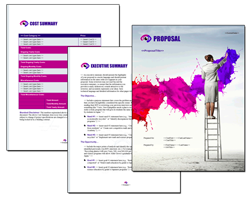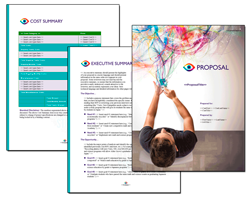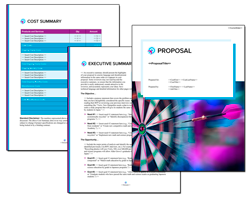
How to Write a Winning Marketing Proposal
Want to know how to write a marketing proposal that wins clients? This guide provides clear, step-by-step instructions for creating a proposal that effectively outlines your strategy, goals, and deliverables, ensuring you stand out from the competition.
Key Takeaways
- A winning marketing proposal clearly defines the client's problem and outlines a solution, fostering trust and collaboration.
- Thorough research and understanding the client's needs are crucial in creating a proposal that resonates with and addresses specific business goals.
- Including clear success metrics, detailed project scopes, and team introductions in the proposal raises credibility and demonstrates your commitment to results.
- Using marketing proposal software ensures your proposals are structured, efficient, and effective. It helps streamline the creation process, includes all necessary topics, and can be customized to suit different marketing strategies.
Understanding Marketing Proposals

A marketing proposal is more than just a written document; it's designed to communicate your marketing strategy, goals, and project specifics to potential clients. Its primary aim is to clearly outline the proposed solution to the client's problem, ensuring that both parties are on the same page regarding expectations and deliverables.
Creating a solid marketing proposal requires several key components: a clear statement of the client's problem, a detailed description of the marketing strategy, and specific project goals and deliverables. Addressing these elements demonstrates your understanding of the client's business growth goals and helps build trust and excitement for the potential collaboration.
A well-written marketing proposal can significantly enhance your chances of winning a contract. It showcases your ability to effectively meet the client's needs, making you a more attractive option than other marketing agencies. Clearly explaining where the client's money is going, the expected results, and the timeline provide a comprehensive view that reassures the client about the effectiveness of your approach.
Researching Your Client's Needs
Understanding your client's business and goals is the cornerstone of an effective marketing proposal. Before writing a marketing proposal, invest time in research to uncover the client's pain points and marketing needs. This involves not only understanding the client's business but also the market dynamics that surround it. This helps identify opportunities and competition related to their goals.
Direct conversations and thorough research are critical for identifying client needs. During these discovery sessions, ask open-ended questions to uncover valuable information about the client's pain points, target audience, and budget. Understanding these issues helps create a proposal that resonates with the client's problems and objectives.
Once you have gathered all the necessary information, the next step is to validate your findings. This ensures that the proposed solutions are grounded in accurate information and tailored to fill gaps in the client's marketing strategy. Aligning your proposed solutions with the client's needs effectively demonstrates your value.
Creating an Executive Summary

The executive summary is the most critical part of your marketing proposal. Its purpose is to grab the client's attention and provide a brief overview of the proposal. Since decision-makers often have limited time, a well-written executive summary can significantly affect whether your proposal gets a thorough review or a quick dismissal.
An effective executive summary should highlight the key points of your marketing strategy, including the problem statement, objectives, goals, target audience, and primary brand message. It should also incorporate findings from your discovery session, a brief solution description, budget, and timing. A solid opening statement sets the stage and captures the reader's interest.
Using visuals such as charts and graphs can enhance clarity and engagement. These help break down complex information and make it easier for the client to grasp the main aspects of your proposal. The executive summary should be concise, spanning just one to three pages, and written after completing the rest of the proposal.
Outlining Your Marketing Strategy
A well-structured digital marketing strategy is the backbone of your marketing proposal. It begins with thorough market research, providing the data and insights to make informed decisions. Knowing where your client's target audience is most active helps identify the proper marketing channels to focus on. Social media engagement is vital in enhancing online presence and building brand awareness, directly contributing to measurable growth in businesses' digital presence.
The key components of a marketing strategy include brand goals, target audience profiles, and marketing channels. Defining precise marketing goals before developing the strategy ensures alignment with the client's overall business objectives. These goals need to adhere to the SMART criteria. They should be specific, measurable, achievable, realistic, and timely.
Measurable key performance indicators (KPIs) are important for evaluating the effectiveness of your marketing strategies. Setting clear KPIs allows you to track progress and adjust tactics to ensure the campaign meets its objectives. Additionally, outlining campaign tactics and how to convey brand messages to reach the target audience is crucial for a winning marketing proposal.
Incorporating all these elements into your marketing strategy section demonstrates your expertise. It shows the client that you have a detailed plan for achieving their business goals through the execution of the marketing campaign.
Defining the Scope of Work

The scope of work is an important part of your marketing proposal as it sets clear expectations and outlines deliverables. This section should include detailed descriptions of tasks, timelines, and responsibilities to ensure effective collaboration between your marketing team and the client. Breaking down the project into specific tasks and assigning responsibilities helps clarify roles and expectations for all team members.
Using a structured template for the scope of work can streamline the planning and execution process, improving organization and communication. Establishing milestones and deadlines aids in tracking project progress and ensuring the timely completion of tasks.
Setting a Timeline and Budget
Setting a realistic timeline is important for managing project expectations and deadlines. A well-defined timeline keeps all stakeholders aligned and accountable, ensuring smooth project progression. Including specific milestones helps track progress through different phases of the marketing project.
A detailed budget breakdown should include estimated costs for all services rendered, promoting transparency and trust. Clear pricing avoids unexpected expenditures for the client and sets clear financial expectations. Regular timeline and budget adherence assessments help make timely adjustments and maintain project momentum.
Detailing Success Metrics

Align success metrics with the client's business goals to demonstrate that your marketing campaign meets their objectives. Key performance indicators (KPIs) are important metrics that gauge the marketing campaign's effectiveness, allowing for objective measurement of success.
Tracking metrics with a defined timeline allows for monitoring progress, while regular assessments enhance transparency and enable timely strategy adjustments. Using quantitative and qualitative measures provides a comprehensive evaluation of the campaign's effectiveness.
Introducing Your Team
Introducing your team in the marketing proposal highlights their roles, expertise, and how they will contribute to the project's success. Briefly presenting team members fosters trust and credibility with potential clients.
Highlighting team members' experience and skills strengthens the proposal's persuasiveness. The project team section should include qualifications, previous achievements, and roles in project execution, showcasing the collective strength of your marketing team.
Including Case Studies and Testimonials

Including case studies of successful past campaigns can demonstrate your team's effectiveness and reinforce claims of delivering results. Case studies and client testimonials are important for your marketing strategy's credibility. Presenting measurable metrics and innovative features can further highlight your agency's capabilities and engage clients with dynamic and appealing elements.
Success stories can be organized in tabs for leisurely exploration, making them accessible to readers. Embedding links to case studies for real-world examples enhances the proposal's effectiveness and provides prospective clients with concrete evidence of your capabilities.
Legal Terms and Conditions
The contract is usually a separate document from the proposal and is signed after the proposal is accepted. Small projects sometimes include a work order or terms and conditions in the proposal.
Clear terms and conditions in your marketing services contract prevent potential disputes and establish a legal framework for service usage. They should outline what is covered in the agreement, including accountability and consequences of unmet obligations.
The Proposal Kit Professional includes the Advertising/Marketing Contract Pack, which includes various advertising and marketing-related contract and agreement documents. The Proposal Kit's Wizard software, which comes with the packages, can help you build and manage your proposals and contracts.
Consult an attorney to ensure your contract's legality and compliance with current laws and regulations. Payment terms and a confidentiality agreement are also important for setting expectations and protecting sensitive information shared during negotiations.
Using Proposal Kit Templates

Proposal Kit templates and automation software can significantly streamline the proposal process, saving time while ensuring high-quality output. Customizable templates enable marketers to align their proposals closely with their brand identity and standardize the proposal format, making it easier for clients to review and compare offers.
Proposal Kit templates and software products include layouts, design themes, and samples for creating compelling marketing proposals. Using these resources can increase client engagement and improve the presentation of your marketing pitch.
Here are some related samples included in every downloadable Proposal Pack
The AI Writer generates a first draft of these templates - customized to your company, client, and project - in just minutes, giving you a head start on editing. Get any Proposal Pack or Proposal Kit Professional, and all of these samples, and the AI Writer are included.
- CD-ROM Development Proposal
- CD-ROM Marketing Materials Creation Proposal
- Corporate Identity Creation Proposal
- Multilingual Web Site and DVD Sample Proposal
- Company Rebranding Sample Proposal
- Real Estate Property Sales Services Proposal
- Photography Services Proposal
- Sponsorship Sample Proposal
- Marketing Campaign Services Sample Proposal
- SEO Services Sample Proposal
- Product Manufacturer Sample Proposal
- Advertising Campaign Services Sample Proposal
- Website Advertising Offer Sample Proposal
- Social Media Marketing Services Sample Proposal
- Printing and Signage Services Sample Proposal
- Public Relations Services Sample Proposal
Here are some related downloadable templates
The AI Writer generates a first draft of these templates - customized to your company, client, and project - in just minutes, giving you a head start on editing. Get any Proposal Pack or Proposal Kit Professional, and all of these templates and the AI Writer are included.
- Affiliate Marketing Proposal Template
- Brand Ambassador Proposal Template
- Brand Design Proposal Template
- Brand Identity Proposal Template
- Brand Influencer Proposal Template
- Business Marketing Proposal Template
- Company Rebranding Proposal
- Corporate Identity Creation Proposal
- Endorsement Seeking Proposal
- FinTech Customer Acquisition Strategy Proposal Template
- Instagram Marketing Proposal Template
- Lead Generation Proposal Template
- Lead Generation Services Proposal
- Linkedin Marketing Proposal Template
- Market Research Proposal Template
- Marketing Agency Proposal Template
- Marketing Automation Proposal Template
- Marketing Campaign Services Proposal (Long)
- Marketing Campaign Services Proposal (Short)
- Marketing Communications Proposal Template
- Marketing Consulting Proposal Template
- Marketing Services Proposal Template
- Outsourcing Telemarketing Proposal
- Public Relations Services Proposal
- Social Media Marketing Services Proposal
- Branding Design Proposal Template
- Branding Proposal Template
- Branding Services Proposal Template
- Marketing Funnels Proposal Template
- Content Marketing Proposal Template
- FinTech Marketing Strategy Proposal Template
- Marketing Job Proposal Template
- Marketing Proposal Template
- Marketing Research Proposal Template
- Content Writing Proposal Template
- Influencer Proposal Template
- Instagram Consulting Proposal Template
Finalizing Your Marketing Proposal
Finalizing your marketing proposal involves thorough proofreading to ensure cohesion and eliminate errors. Reading the proposal aloud helps identify awkward phrases and mistakes that visual proofreading cannot catch.
Various proofreading techniques, such as online grammar tools, will help improve the readability of your proposal and catch more issues than Word's built-in proofreading tools.
A colleague's input can provide valuable insights and catch overlooked mistakes, ensuring your final proposal is polished and professional.
Summary

Writing a winning marketing proposal involves understanding the client's needs, creating an executive summary, outlining a detailed marketing strategy, and clearly defining the scope of work. Setting a realistic timeline and budget, detailing success metrics, introducing your team, and including case studies and testimonials strengthen your proposal.
By following these steps and using Proposal Kit templates and software, you can create a marketing proposal that stands out and wins clients. Success lies in thorough research, clear communication, and attention to detail.
 Proposal Kit Professional provides the most content, including legal contracts and a free design theme pack. Plus, advanced software features include custom branding and customizable quoting databases.
Proposal Kit Professional provides the most content, including legal contracts and a free design theme pack. Plus, advanced software features include custom branding and customizable quoting databases. Proposal Pack for Any Business covers this type of proposal and includes samples. There are also some commonly used specialty design themes available:
Proposal Pack for Any Business covers this type of proposal and includes samples. There are also some commonly used specialty design themes available:Photo Design Proposal Packs
Line Art Design Proposal Packs
 Proposal Pack Bubbles #1
Proposal Pack Bubbles #1 Proposal Pack Bullseye #1
Proposal Pack Bullseye #1 Proposal Pack Bullseye #2
Proposal Pack Bullseye #2 Proposal Pack Concepts #1
Proposal Pack Concepts #1 Proposal Pack Concepts #10
Proposal Pack Concepts #10 Proposal Pack Concepts #11
Proposal Pack Concepts #11 Proposal Pack Concepts #2
Proposal Pack Concepts #2 Proposal Pack Concepts #3
Proposal Pack Concepts #3 Proposal Pack Concepts #4
Proposal Pack Concepts #4 Proposal Pack Concepts #5
Proposal Pack Concepts #5 Proposal Pack Concepts #6
Proposal Pack Concepts #6 Proposal Pack Concepts #7
Proposal Pack Concepts #7 Proposal Pack Concepts #8
Proposal Pack Concepts #8 Proposal Pack Concepts #9
Proposal Pack Concepts #9 Proposal Pack Symbols #1
Proposal Pack Symbols #1 Proposal Pack Symbols #2
Proposal Pack Symbols #2 Proposal Pack Symbols #3
Proposal Pack Symbols #3 Proposal Pack Symbols #4
Proposal Pack Symbols #4 Proposal Pack Symbols #5
Proposal Pack Symbols #5 Proposal Pack Symbols #6
Proposal Pack Symbols #6
Frequently Asked Questions
What is the primary purpose of a marketing proposal?
The primary purpose of a marketing proposal is to communicate your strategies and goals to potential clients and demonstrate how you can meet their objectives. By doing so, you position yourself as a knowledgeable partner ready to drive their success.
Why is market research important in creating a marketing proposal?
Market research is important for creating a successful marketing proposal. It equips you with vital data to understand customer needs and pinpoint opportunities. With this insight, you can make a more compelling strategy that truly resonates with your audience.
What should be included in an executive summary?
An executive summary should clearly outline the marketing strategy, problem statement, objectives, target audience, budget, and key findings. By including these elements, you can create an overview that effectively drives your message home.
How do proposal kit templates help create marketing proposals?
Proposal Kit templates make creating marketing proposals effortless and efficient. They allow you to customize premade layouts and designs that perfectly reflect your brand. This ensures your proposals are professional and saves you valuable time so you can focus on what matters most.
How do I include legal terms and conditions in a marketing proposal?
Including legal terms and conditions in your marketing proposal is important to prevent disputes and clarify expectations, ensuring both parties are on the same page. This will protect you and foster trust and professionalism in your partnerships. Terms and conditions may be included in a short, low-risk proposal, such as a Work Order page or Terms and Conditions page. Most of the time, a contract is a separate document from the proposal and is signed after the proposal is accepted. Consult your attorney for the best approach for your business.



 Cart
Cart
 Are you just looking for a template, sample, or software for your marketing proposals? Click these links to skip down the page and get right to it.
Are you just looking for a template, sample, or software for your marketing proposals? Click these links to skip down the page and get right to it.








 Facebook
Facebook YouTube
YouTube Bluesky
Bluesky Search Site
Search Site